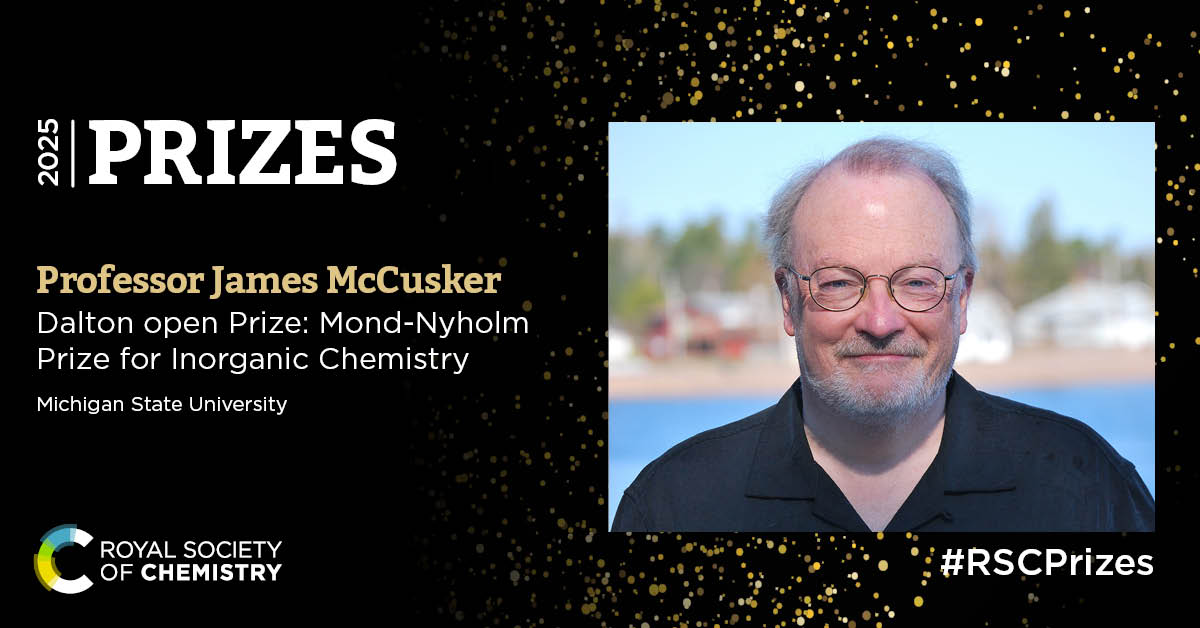McCusker receives Royal Society of Chemistry Prize
Exploring the photophysical properties of elements like iron and cobalt, McCusker’s lab is paving the way for cost-effective, environmentally friendly and scalable chemistry

James K. McCusker, a University Research Foundation Professor in the College of Natural Science, has been awarded the Royal Society of Chemistry’s prestigious Mond-Nyholm Prize for Inorganic Chemistry.
This honor recognizes McCusker’s groundbreaking research into the photophysical properties of first-row transition metal complexes such as iron and cobalt.
By better understanding these abundant elements, McCusker’s lab is paving the way for cost-effective, environmentally friendly and scalable chemistry, whose applications range from energy storage and conversion to light-driven organic synthesis.
When McCusker began this research in the 1990s, he found himself venturing into unexplored territory.
“I distinctly recall my Program Officer for the Solar Photochemistry Program at the Department of Energy letting out a big sigh when I told her that I was planning to focus my renewal proposal on iron-based compounds,” McCusker said, who joined MSU’s Department of Chemistry in 2001.
As time would tell, the decision proved incredibly fruitful, with his lab now widely recognized for creating entirely new avenues of photophysical study.
“For roughly a decade, my group was on a metaphorical island: no other groups were working on these kinds of compounds,” he added, noting that today, an issue of the Journal of the American Chemical Society or Inorganic Chemistry will likely contain a paper or two on the subject.
“For me, that’s really gratifying. I think we played a small but important role in creating this area of research, and, of course, all the credit goes to my terrific students who have been doing the hard work.”
In conversation with the Royal Society of Chemistry, McCusker pointed to his scientific path as encouragement for those considering a career in chemistry.
"Follow your passion when it comes to your science. Don't try to anticipate what others may or may not view as exciting or worthwhile research. Identify problems that you find interesting and go after them," he said.
With this honor, McCusker joins a prestigious list of past winners in the Royal Society of Chemistry’s prize portfolio, including 60 Nobel laureates. The award is also the latest accolade highlighting McCusker’s groundbreaking science and mentorship during his time at MSU.
In addition to a William J. Beal Outstanding Faculty Award and the Chemical Dynamics Award – also from the Royal Society of Chemistry – he was the 2024 recipient of the American Chemical Society's Josef Michl Award in Photochemistry.

Looking ahead, McCusker is particularly excited about the far-reaching impact of his lab’s work with earth-abundant photoredox catalysis.
In 2023, the team published a paper in Science with good friend and Nobel laureate Dave MacMillan of Princeton University. This study demonstrated how the unexpected photophysical properties of simple cobalt(III) complexes can open up entirely unanticipated pathways for their use in organic chemistry.
“Dave tells me that the pharmaceutical industry is already incorporating some of these ideas into their chemistry, which is pretty cool,” McCusker said.
“These sorts of advances were made possible by the fundamental chemistry we’re doing in our lab, something I believe is a worthwhile example to highlight given the degree to which support for science is under attack in this day and age. Were it not for the support we received from the Department of Energy to pursue this line of research, this discovery would never have been made,” he added.
As part of his award, McCusker will receive £3,000, a medal, a certificate, and will embark on a UK lecture tour to share his research with the broader scientific community.
For a full press release including an Q&A with McCusker about his work and inspiration, please visit the Royal Society of Chemistry’s website.
- Categories: